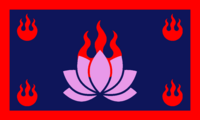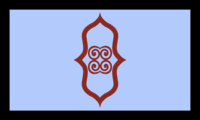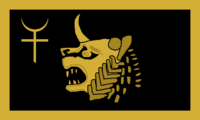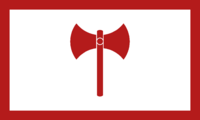The Four Banners (Salmuria): Difference between revisions
No edit summary |
|||
| (17 intermediate revisions by the same user not shown) | |||
| Line 96: | Line 96: | ||
Historically following the [[Naciwas]] conquest of the [[Proto Salmurians]] and the rise of the modern [[Qibirad]] in order to create powerful and loyal regional lords, form early standing armies, as well as grant some minor cultural autonomy to the Proto Salmurian groups [[Historic Idulula| Idulula]] and [[Historic Salmus| Salmus]] established the [[Gujan System]] which would also form the basis of the 4 banners and in some form would last to the modern day. All of the Gujanas function relatively similarly with powerful merchant and martial families acting as a faux nobility as well as a Gujan Council dealing with political and civil matters within the Gujan's territory. Traditionally the succession of a Gujan's leadership was done to the eldest child this was never set in stone and would typically go to the most economically or martially talented individual or the one favored by the Ciwas. The military arm of the Gujan system, the four banners would historically been done by birth, people born in various regions with a family name of that region would be automatically mandated to join their Gujan's banner as a warrior or soldier. The martial aspect of the coastal Gujans would help the Salmurians fend off multiple invasions and raids throughout history and remained relatively unchanged until the 17th century. | Historically following the [[Naciwas]] conquest of the [[Proto Salmurians]] and the rise of the modern [[Qibirad]] in order to create powerful and loyal regional lords, form early standing armies, as well as grant some minor cultural autonomy to the Proto Salmurian groups [[Historic Idulula| Idulula]] and [[Historic Salmus| Salmus]] established the [[Gujan System]] which would also form the basis of the 4 banners and in some form would last to the modern day. All of the Gujanas function relatively similarly with powerful merchant and martial families acting as a faux nobility as well as a Gujan Council dealing with political and civil matters within the Gujan's territory. Traditionally the succession of a Gujan's leadership was done to the eldest child this was never set in stone and would typically go to the most economically or martially talented individual or the one favored by the Ciwas. The military arm of the Gujan system, the four banners would historically been done by birth, people born in various regions with a family name of that region would be automatically mandated to join their Gujan's banner as a warrior or soldier. The martial aspect of the coastal Gujans would help the Salmurians fend off multiple invasions and raids throughout history and remained relatively unchanged until the 17th century. | ||
===Formation of the Green Standard=== | ===Formation of the Green Standard and the Banner's War=== | ||
{{Main|Salmurian Green Standard Army}} | {{Main|Salmurian Green Standard Army}} | ||
In the mid | {{main|Salmurian Banner's War}} | ||
In the mid 17th century Salmuth decided that the old banners system could no longer meet the needs of a rapidly changing world he declared that Salmuria would now need a regular standing non banner aligned army for the whole island. This would become the Green Standard Army which would also have the secondary purpose of a national [[Wikipedia:gendarmerie|gendarmerie]]. The Four Banners would instantly see tremendous change and an identity crisis following the formation of the Green Standard and would see their transformation from being "the" army of Salmuria and begin their transition to filling the modern niche of a well equipped and training professional and specialized force. | |||
===Further Specializations and Early Modern Era=== | ===Further Specializations and Early Modern Era=== | ||
TBA | TBA | ||
===Modern 4 Banners=== | ===Modern 4 Banners=== | ||
TBA | TBA | ||
==Place of the Four Banners== | |||
===Relationship with modern militant orders=== | |||
{{Main| Salmurian Military}} | |||
{{Main| Salmurian Militant Orders}} | |||
===Relationship with modern Gujan governments=== | |||
==Organization== | ==Organization== | ||
TBA | TBA | ||
{| class="wikitable" | |||
|- | |||
! Banner !! English !! Salmurian !! Gujan | |||
|- | |||
| | |||
[[File:Birabyaš.png|200px]] | |||
|| [[Red Labyš Banner]] || 𐤠𐤣𐤬 𐤩𐤠𐤡𐤧𐤳 𐤩𐤵𐤵𐤭𐤳 <br>Aθo Labyš Lããrš || 𐤡𐤦𐤭𐤠𐤡𐤧𐤠𐤳 <br> [[Birabyaš Gujan| Birabyaš]] | |||
|- | |||
| [[File:Sriviš.png|200px]] || [[Flaming Lotus Banner]] || 𐤪𐤰𐤭𐤪𐤦 𐤴𐤶𐤭𐤠𐤯𐤦𐤳 𐤩𐤵𐤵𐤭𐤳 <br>Murmi Τẽratiš Lããrš|| 𐤮𐤭𐤦𐤥𐤦𐤳 <br> [[Sriviš Gujan| Sriviš]] | |||
|- | |||
| [[File:Moreuš.png|200px]] || [[Sanguineous Sky Banner]] || 𐤨𐤰𐤭𐤨𐤤𐤪𐤰𐤮 𐤨𐤬𐤮𐤪𐤦𐤳 𐤩𐤵𐤵𐤭𐤳 <br> Kurkemus Kosmiš Lããrš || 𐤪𐤬𐤭𐤤𐤰𐤳 <br> [[Moreuš Gujan| Moreuš]] | |||
|- | |||
| [[File:Astrkosins.png|200px]] || [[Bull Lion Banner]] || 𐤨𐤠𐤩𐤠 𐤲𐤠𐤲𐤠𐤫 𐤩𐤵𐤵𐤭𐤳 <br> Kala Qaqan Lããrš|| 𐤠𐤮𐤯𐤭𐤨𐤬𐤮𐤦𐤫𐤳 <br> [[Astrkosinš Gujan| Astrkosinš]] | |||
|- | |||
|} | |||
===Ethnic Composition=== | ===Ethnic Composition=== | ||
TBA | TBA | ||
==Banner Soldiers== | ==Banner Soldiers== | ||
TBA | |||
===Notable Banner Soldiers=== | |||
TBA | TBA | ||
Latest revision as of 08:00, 23 May 2024
The Four Banners are administrative-military divisions under Salmuria
| Four Banners | |
|---|---|
| 𐤲𐤶 𐤩𐤵𐤵𐤭𐤠𐤮 | |
| Country | Salmuria |
| Allegiance | Salmuria |
| Type | Infantry Cavalry |
| Role | Land Forces with minor attached air units |
| Colors | white, sky blue, gold, sea blue |
History
Establishment
Historically following the Naciwas conquest of the Proto Salmurians and the rise of the modern Qibirad in order to create powerful and loyal regional lords, form early standing armies, as well as grant some minor cultural autonomy to the Proto Salmurian groups Idulula and Salmus established the Gujan System which would also form the basis of the 4 banners and in some form would last to the modern day. All of the Gujanas function relatively similarly with powerful merchant and martial families acting as a faux nobility as well as a Gujan Council dealing with political and civil matters within the Gujan's territory. Traditionally the succession of a Gujan's leadership was done to the eldest child this was never set in stone and would typically go to the most economically or martially talented individual or the one favored by the Ciwas. The military arm of the Gujan system, the four banners would historically been done by birth, people born in various regions with a family name of that region would be automatically mandated to join their Gujan's banner as a warrior or soldier. The martial aspect of the coastal Gujans would help the Salmurians fend off multiple invasions and raids throughout history and remained relatively unchanged until the 17th century.
Formation of the Green Standard and the Banner's War
In the mid 17th century Salmuth decided that the old banners system could no longer meet the needs of a rapidly changing world he declared that Salmuria would now need a regular standing non banner aligned army for the whole island. This would become the Green Standard Army which would also have the secondary purpose of a national gendarmerie. The Four Banners would instantly see tremendous change and an identity crisis following the formation of the Green Standard and would see their transformation from being "the" army of Salmuria and begin their transition to filling the modern niche of a well equipped and training professional and specialized force.
Further Specializations and Early Modern Era
TBA
Modern 4 Banners
TBA
Place of the Four Banners
Relationship with modern militant orders
Relationship with modern Gujan governments
Organization
TBA
| Banner | English | Salmurian | Gujan |
|---|---|---|---|
| Red Labyš Banner | 𐤠𐤣𐤬 𐤩𐤠𐤡𐤧𐤳 𐤩𐤵𐤵𐤭𐤳 Aθo Labyš Lããrš |
𐤡𐤦𐤭𐤠𐤡𐤧𐤠𐤳 Birabyaš | |
 |
Flaming Lotus Banner | 𐤪𐤰𐤭𐤪𐤦 𐤴𐤶𐤭𐤠𐤯𐤦𐤳 𐤩𐤵𐤵𐤭𐤳 Murmi Τẽratiš Lããrš |
𐤮𐤭𐤦𐤥𐤦𐤳 Sriviš |
 |
Sanguineous Sky Banner | 𐤨𐤰𐤭𐤨𐤤𐤪𐤰𐤮 𐤨𐤬𐤮𐤪𐤦𐤳 𐤩𐤵𐤵𐤭𐤳 Kurkemus Kosmiš Lããrš |
𐤪𐤬𐤭𐤤𐤰𐤳 Moreuš |
 |
Bull Lion Banner | 𐤨𐤠𐤩𐤠 𐤲𐤠𐤲𐤠𐤫 𐤩𐤵𐤵𐤭𐤳 Kala Qaqan Lããrš |
𐤠𐤮𐤯𐤭𐤨𐤬𐤮𐤦𐤫𐤳 Astrkosinš |
Ethnic Composition
TBA
Banner Soldiers
TBA
Notable Banner Soldiers
TBA
